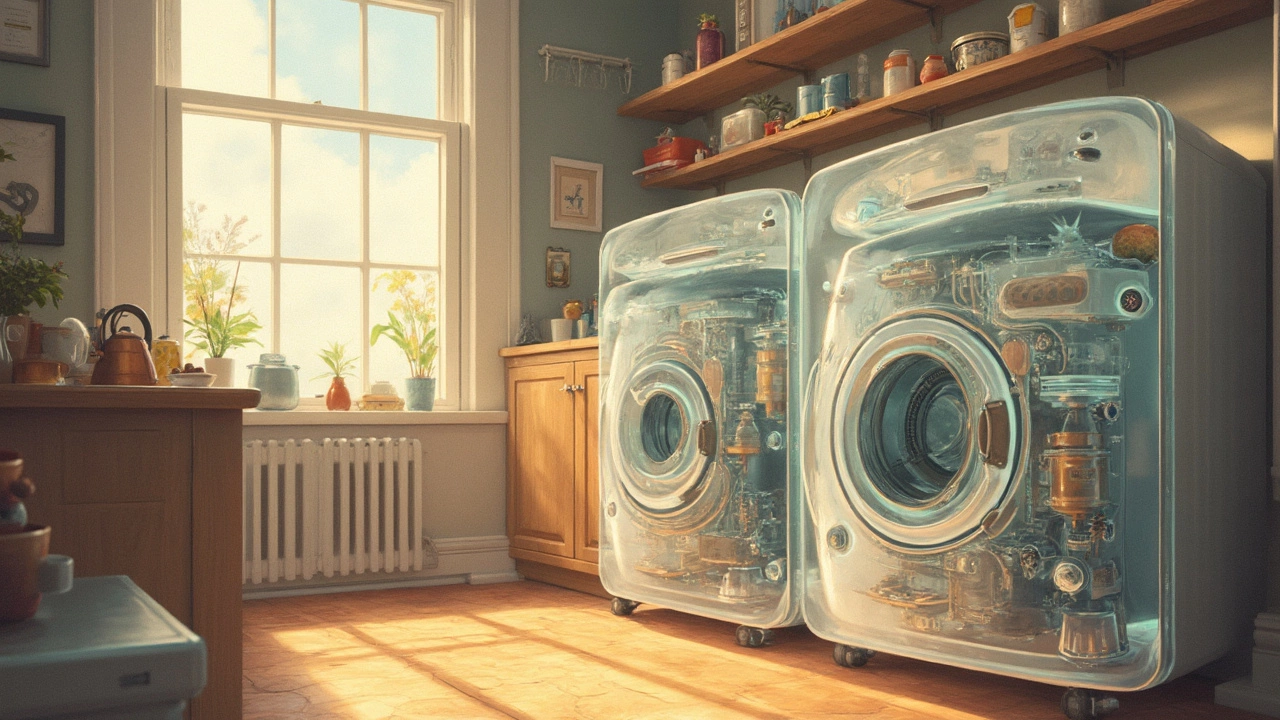Have you ever stood in front of your fridge, coffee maker, or vacuum and wondered, "How exactly does this thing work?" Most of us don't give it a second thought until something goes wrong. But a little knowledge about how these devices function can come in handy. It not only satisfies curiosity but can also save you a buck when it comes to maintenance.
Take your fridge, for instance. It's not just a cold box. It's a marvel of engineering, working non-stop to keep your perishables fresh through a system of compressors, condensers, and evaporator coils. Knowing this, you can better understand why it's crucial to ensure good airflow around the back and inside of the fridge.
And then there's the washing machine — the unsung hero of laundry day. From agitators to spinning drums, each part has a role in making sure your clothes come out fresh and clean. They might look complicated, but once you break down the parts, they make a lot more sense. Plus, this knowledge can be a lifesaver when you're faced with a mysterious leak or a spinning drum that refuses to, well, spin.
The truth is, understanding the basic mechanics and components gives you a head start in troubleshooting and caring for your appliances. Keep reading, and you'll get to know your household helpers a whole lot better.
- Introduction to Appliance Mechanics
- Basic Components Explained
- Common Appliance Problems and Fixes
- Maintenance Tips You Can Handle
- When to Call a Professional
Introduction to Appliance Mechanics
Ever stopped to think about how your trusty vacuum or refrigerator does its job? These household heroes don't just run on magic—they rely on carefully crafted machinery designed to make our lives easier. So, let's peek under the hood and see what's happening in there.
First off, let's talk about the basics. At the heart of many appliance mechanics is the motor. This little powerhouse converts electrical energy into motion, setting things in action whether it's spinning the drum of your washing machine or operating the blades in your blender. Without it, your appliances would just sit there looking pretty.
Understanding Core Components
Diving deeper, other key components include the compressor (think fridges), heating elements (like in ovens and dryers), and cooling fans (computers, anyone?). Each plays its role in making sure the appliance does what it's supposed to do efficiently.
An interesting fact? Most modern refrigerators use about 70% less electricity today than those built in the 1970s. That's because of advancements in compressors and improved insulation technology.
Why This Matters?
Knowing how these parts work together makes it easier to spot when something's off. Water pooling at the bottom of the fridge? It might be a clogged defrost drain. Oven taking forever to heat up? Could be a busted heating element. Understanding these basics can help you identify issues early, potentially saving on costly repairs.
Of course, not all maintenance can be done by the average Joe. Some fixes need a pro who knows appliance service like the back of their hand. But knowing a little about what's inside your appliances empowers you to make informed choices and keep your home running smoothly.
| Appliance | Main Component | Common Issue |
|---|---|---|
| Refrigerator | Compressor | Not cooling |
| Washing Machine | Motor | Drum won't spin |
| Oven | Heating Element | Not heating up |
Ready to become a bit of an appliance whisperer? Understanding these mechanics is the first step.
Basic Components Explained
Ever peered into the depths of your appliances and wondered what magic keeps them working? Well, let's demystify some of these common household heroes. Most appliances, whether it's the fridge in your kitchen or the washer in your laundry, share basic components that help them run smoothly and efficiently.
Compressors and Condensers
These are the heart and lungs of appliances like fridges and air conditioners. Compressors pressurize refrigerant gases and keep them moving through the system. Meanwhile, condensers help dissipate heat when the gases turn back into liquids. Keeping these components clean and free from dust can enhance their lifespan.
Heating Elements
Heating elements are the stars in ovens, dryers, and even coffee makers. They convert electrical energy into heat, transforming your batch of cookie dough into a delicious treat or drying a load of laundry. When these break down, they might cause uneven heating or stop working entirely.
Motors
Motors are the workhorses in vacuums, washers, and mixers. They convert electrical energy into mechanical energy, making things spin, roll, and tumble. When a motor fails, it can be due to worn-out bearings or electrical issues. Regularly checking and servicing these can prevent abrupt breakdowns.
For those who enjoy a good breakdown of numbers:
| Appliance | Average Lifespan (Years) | Common Failure |
|---|---|---|
| Refrigerator | 14 | Compressor issues |
| Washing Machine | 12 | Motor failure |
| Microwave | 9 | Heating element malfunction |
Control Systems
Modern appliances come with fancy control panels that look a bit like mission control. These allow us to set specific temperatures, speeds, and times. They're built of microprocessors and circuits that process user commands. When these act up, they often show error codes — a handy way the appliance tells you what's wrong.
Understanding these building blocks can help you diagnose issues faster and even extend the life of your beloved appliances. Plus, you might just impress friends with your knowledge of how a washing machine tweaks speeds or a fridge keeps your groceries cold, even on the hottest of days.

Common Appliance Problems and Fixes
Let's face it: appliances can be unpredictable. One day they're humming along perfectly, and the next, you're left scratching your head when things go haywire. But don't worry, a lot of these issues have pretty straightforward fixes.
Refrigerator Not Cooling
When your fridge isn't chilling like it used to, it could be a blocked condenser fan. Make sure it's not obstructed by dust or debris. If it is, a good cleaning often does the trick. Another common culprit is a faulty thermostat.
Washer Not Draining
A washing machine that leaves your clothes soaking might have a clogged drain hose. Check for kinks or blockages. If the hose is clear, the problem might be the pump, which sometimes requires professional attention.
Dishwasher Leaving Spots
Spots on your dishes could point to hard water. Using a rinse aid helps. As a quick DIY hack, scrubbing the inside with vinegar can also cut down on mineral deposits.
"Regular maintenance can prevent a lot of appliance issues from becoming a major headache," says John Doe, a veteran appliance technician at FixIt Fast Co.
Microwave Not Heating
If your microwave runs but doesn't heat, the magnetron might be the issue. That's often a job for the pros, so don't attempt this repair yourself due to high-voltage risks.
Vacuum Has No Suction
A vacuum cleaner that's lost its suction power might have a full bag or clogged filter. Empty the bag and clean filters regularly. If that doesn't help, check for blockages in the hose.
Being aware of these common issues and their fixes can keep your appliance service costs down and ensure smooth operations in your home. Besides, nothing beats the satisfaction of solving a pesky problem yourself!
Maintenance Tips You Can Handle
Keeping your appliance in tip-top shape doesn’t always mean hiring a pro. A bit of DIY maintenance can extend lifespans and cut down repair costs. Here’s how you can tackle some basic stuff from the comfort of your home.
Refrigerator Care
Let’s start with your trusty fridge. Twice a year, pull it away from the wall and give those condenser coils a good clean. Dust and gunk are not your fridge’s friends—they make it work harder and jack up your energy bill.
- Unplug the fridge before you start.
- Use a coil brush to gently clean off dust and debris.
- Vacuum the area around them.
Also, those door seals? Keep ‘em streak-free with mild soapy water to ensure the cool stays in.
Washing Machine Wisdom
Your washing machine needs love, too. Most people don’t know it, but leaving the door slightly open after a cycle prevents mold. Trust me, your clothes will thank you.
- Run an empty wash cycle with hot water and vinegar once a month.
- Use quality detergents and avoid overloading.
- Check hoses for any cracks regularly.
With a few simple steps, your washer’s lifetime will stretch beyond its years.
Microwave Smarts
Microwaves are easy. A bit of regular attention to the door seal and interior can make a big difference. Boil a bowl of water with lemon slices inside. The steam softens all that gunk, making it easy to wipe away.
General Tips
Don’t put off emptying your vacuum bag or cleaning out those air filters either. They keep household appliance running efficiently. If you notice unusual noises or smells, take it as a sign to check for blockages, especially in the vacuum.
Staying on top of these tasks can save an average household over $200 a year. Small efforts lead to big savings and keep everything running smoothly. Now you’re your own appliance-savvy hero!

When to Call a Professional
Alright, so you've done all you can, but your appliance is still acting up. How do you know it's time to bring in the experts? Let's break it down.
Electrical and Gas Issues
If you're dealing with electrical problems, like a tripping circuit breaker or a gas leak, stop right there. These are hazards that require a licensed technician. Messing with electrical or gas lines can be not just risky but downright dangerous.
Complex Mechanical Problems
When the issue involves complicated mechanics that you can't quite wrap your head around—such as a malfunctioning refrigerator compressor or a washing machine transmission problem—it's best to let the pros handle it. These parts often need specialized tools and expertise to diagnose and fix effectively.
Persistent Issues
If you've tried the usual tricks and DIY fixes to no avail, it's time to call in a professional. An appliance repair specialist can offer insights and solutions you might not be aware of, helping you avoid further damage or more costly repairs down the line.
Validity of Warranty
Is your appliance still under warranty? Attempting repairs yourself might void that warranty. Always check your warranty terms before rolling up your sleeves, and consider professional service to keep your coverage intact.
Tips for Choosing the Right Technician
- Look for someone certified and experienced in appliance service.
- Ask for quotes from multiple sources to ensure reasonable pricing.
- Check reviews or get recommendations from friends or family.
Making the call to a professional might feel like surrender, but it's smart when your peace of mind and safety are on the line. Plus, the sooner you get your appliance back in working order, the less disruption to your daily routine. So, don't hesitate when it's time to ring those experts.


